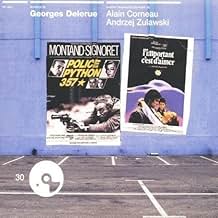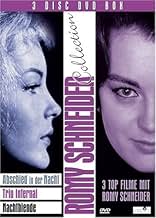Servais Mont conoce a Nadine Chevalier, quien gana su dinero protagonizando películas baratas.Servais Mont conoce a Nadine Chevalier, quien gana su dinero protagonizando películas baratas.Servais Mont conoce a Nadine Chevalier, quien gana su dinero protagonizando películas baratas.
- Dirección
- Guionistas
- Elenco
- Premios
- 2 premios ganados y 3 nominaciones en total
Henri Coutet
- Le père de Jacques
- (escenas eliminadas)
Andrée Tainsy
- La mère de Jacques
- (escenas eliminadas)
- (as Andree Tainsy)
Robert Dadiès
- Le médecin à l'hôpital
- (as Robert Dadies)
- …
Opiniones destacadas
A very simple, and (thus) extremely powerful film. And, sadly, underrated. It's a mind-opening experience. It doesn't say anything new or different on the subject, its simplicity and consistence shows loud and clear that...love is nothing but pain, but it's the only thing worth fighting (living; feeling pain) for; the only thing that sets you free. When Schneider's personage finds an earlier repulsive photograph dying in his desolated apartment you get to feel that now she cannot not love him... A very sincere, believable, touching film resembling real life and real love. Every actor's work is praise-worth, and worth the film's title. They knew what each of them were talking about. And no wonder Kinski took part in this. (The mood of this film is somehow similar to Last Tango in Paris.) You can almost feel wounded along with these 'people' that are being thrashed by love.
This film is a little more complex than the title suggests. Love is only one of the elements of the picture.
In fact, I would say most of the movie is spent on producing "art" that you are not proud of. This theme is throughout the movie. You get the impression that it is being bolted into your nerves like a physical trauma bolts in disdain.
We also deal with the end of youth and how we cope with it. The film is indeed extremely raw. The scenes are meant to be honest and to the point. We get very little sidestepping when it comes to the point of scenes. Perhaps the actors will discuss things in a roundabout way, but the theme slices through each scene like a scimitar.
On the subject of love. This is very important to the movie as well. Even though there are virtually no signs of it til the very end, there is a longing for it. And that is what most good romances are about. Sydney Pollock once said something to the effect of, the interesting part of a Romance Film is the longing for the connection between the characters. You can have a couple of slow motion scenes of them waltzing through the park and feeding each other fruits, but that isn't what drives the story and the film. Perhaps that is why this film is so good.
In fact, I would say most of the movie is spent on producing "art" that you are not proud of. This theme is throughout the movie. You get the impression that it is being bolted into your nerves like a physical trauma bolts in disdain.
We also deal with the end of youth and how we cope with it. The film is indeed extremely raw. The scenes are meant to be honest and to the point. We get very little sidestepping when it comes to the point of scenes. Perhaps the actors will discuss things in a roundabout way, but the theme slices through each scene like a scimitar.
On the subject of love. This is very important to the movie as well. Even though there are virtually no signs of it til the very end, there is a longing for it. And that is what most good romances are about. Sydney Pollock once said something to the effect of, the interesting part of a Romance Film is the longing for the connection between the characters. You can have a couple of slow motion scenes of them waltzing through the park and feeding each other fruits, but that isn't what drives the story and the film. Perhaps that is why this film is so good.
Hardly anything witty about love has dawned on Zulawski's third feature, an almost exclusively chamber drama, where a burgeoning attraction between a pornography photographer Servais Mont (Testi) and a second-rate actress Nadine Chevalier (Schneider), has barely taken off from the platonic struggle, because Nadine is married to Jacques (Dutronc), to whom she bears a tangible fusion of gratitude, responsibility and affection, which complicates their situation into a torrid emotional abyss so as to testify that love is indeed the most inscrutable, unpredictable, yet the most important thing.
Crammed in the high-ceiling, antique-looking Parisian apartments and loci like theatre, bar and hospital, its mise-en-scène strains to stay claustrophobic, fluid and quivering, signals the characters' shaky states, but, Zulawski and the screenwriter Christopher Frank fail to let their emotions run the full gamut to reach out its dazzled viewers, a stately but shallowly anaemic Testi cannot portray a role, whose inner depth is apparently out of his league, fumbles and routinely daydreams from scene to scene, his fervent gaze can not justify Servais' actions, his thoughts, and the limp dialogue doesn't help either.
Ms. Schneider, won Best Actress in the first-ever César Awards, is palpably more tapped into her role, sending off her raw charisma into her inwardly paralysed psyche, she tries to be frank with her own feelings, desire, dignity and pride at her own peril, but there are too many smoke and mirrors around to indulgently mystify an uncompounded, and fragmented story-line, the only thing to ameliorate the faint exasperation is when the pure dramatic sequences take the stage: Kinski's spit-fire flare-up is a mood-enforcer, Dutronc stands out in his chummy whims and delightfully erratic behavioural conundrum, a peculiar man who withdraws into a reprieve from, in an obvious tenor, a husband's functionality (abruptly falls into slumber so that his wife can only hopelessly play with herself to slake her desire), but also hatches up something seemingly unspeakable and inexplicable with Servais through an undertone of self-abandonment and total capitulation, in a muscle-versus-quirk contest over the same woman.
Zulawski's highbrow ambition to extract something refine and sophisticated out of the triangular deadlock doesn't consummately do the trick, in the end, Servais has to pay his debt with his blood and internal bleeding, from a father figure Mazelli (Dauphin), in his case, love IS the most important thing, if he can endure all the pain both physically and mentally, to demonstrate his unconditional devotion.
Georges Delerue's score is ever so conspicuous whenever a close-up is zoomed in between Servais and Nadine, to cloyingly illustrate their passion, otherwise, it remains forbidding and sinister, circles around a pessimistic account of love, in its purest but strangely tepid manifestation.
Crammed in the high-ceiling, antique-looking Parisian apartments and loci like theatre, bar and hospital, its mise-en-scène strains to stay claustrophobic, fluid and quivering, signals the characters' shaky states, but, Zulawski and the screenwriter Christopher Frank fail to let their emotions run the full gamut to reach out its dazzled viewers, a stately but shallowly anaemic Testi cannot portray a role, whose inner depth is apparently out of his league, fumbles and routinely daydreams from scene to scene, his fervent gaze can not justify Servais' actions, his thoughts, and the limp dialogue doesn't help either.
Ms. Schneider, won Best Actress in the first-ever César Awards, is palpably more tapped into her role, sending off her raw charisma into her inwardly paralysed psyche, she tries to be frank with her own feelings, desire, dignity and pride at her own peril, but there are too many smoke and mirrors around to indulgently mystify an uncompounded, and fragmented story-line, the only thing to ameliorate the faint exasperation is when the pure dramatic sequences take the stage: Kinski's spit-fire flare-up is a mood-enforcer, Dutronc stands out in his chummy whims and delightfully erratic behavioural conundrum, a peculiar man who withdraws into a reprieve from, in an obvious tenor, a husband's functionality (abruptly falls into slumber so that his wife can only hopelessly play with herself to slake her desire), but also hatches up something seemingly unspeakable and inexplicable with Servais through an undertone of self-abandonment and total capitulation, in a muscle-versus-quirk contest over the same woman.
Zulawski's highbrow ambition to extract something refine and sophisticated out of the triangular deadlock doesn't consummately do the trick, in the end, Servais has to pay his debt with his blood and internal bleeding, from a father figure Mazelli (Dauphin), in his case, love IS the most important thing, if he can endure all the pain both physically and mentally, to demonstrate his unconditional devotion.
Georges Delerue's score is ever so conspicuous whenever a close-up is zoomed in between Servais and Nadine, to cloyingly illustrate their passion, otherwise, it remains forbidding and sinister, circles around a pessimistic account of love, in its purest but strangely tepid manifestation.
Beautiful movie of three persons seeking to live, love and survive... Romy Schneider's performance is stunning as a porn actress desperately in love with a man who doesn't wish to live anymore, and resisting the seduction of a photograph. The picture is pretty "intellectual", but not boring. Soundtrack is fabulous...A great 70's melodrama. And what a pleasure to see Kinski!
Must see.
Must see.
A simple story about an actress, her sentimental dilemma , dark atmosphere and one of the most powerful roles of Romy Schneider. In same measure, a dark exploration of compromisses , limits of intense love and pure addiction, Fabio Testi reminding a young Andrei Batalov and offering fair portrait of vulnerable young photographer, under pressure of parent, friend, protectors and the woman who he loves and her, brilliant acted by Dutronc, husband.
A great film , gloomy, bitter but pure honest , proposing not exactly pleasant ways but the truths defining, in its basic dates, its essence.
In short, not comfortable, near bizarre but fascinating for the precise images of vulnerability .
A great film , gloomy, bitter but pure honest , proposing not exactly pleasant ways but the truths defining, in its basic dates, its essence.
In short, not comfortable, near bizarre but fascinating for the precise images of vulnerability .
¿Sabías que…?
- TriviaRomy Schneider considered this movie her best work.
- Citas
Jacques Chevalier: J'ai rêvé de toi. Tu me versais du Coca-Cola dans l'oreille... Une vilaine mort, croyez-moi !
- Versiones alternativasItalian video version excludes some violent and explicit erotic scenes and runs 105 min.
- ConexionesFeatured in La mano negra (1980)
Selecciones populares
Inicia sesión para calificar y agrega a la lista de videos para obtener recomendaciones personalizadas
- How long is That Most Important Thing: Love?Con tecnología de Alexa
Detalles
- Fecha de lanzamiento
- Países de origen
- Idioma
- También se conoce como
- That Most Important Thing: Love
- Locaciones de filmación
- Productoras
- Ver más créditos de la compañía en IMDbPro
Taquilla
- Total en EE. UU. y Canadá
- USD 19,120
- Fin de semana de estreno en EE. UU. y Canadá
- USD 5,370
- 16 jul 2017
- Total a nivel mundial
- USD 19,120
- Tiempo de ejecución1 hora 49 minutos
- Mezcla de sonido
- Relación de aspecto
- 1.66 : 1
Contribuir a esta página
Sugiere una edición o agrega el contenido que falta

Principales brechas de datos
What is the English language plot outline for L'important c'est d'aimer (1975)?
Responda

































